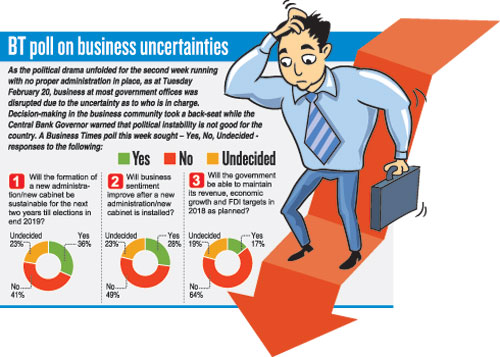SL business confidence in negative territory
View(s):Business confidence is seen in negative territory while achieving targets set this year for economic growth, foreign investment and tax revenue would be “challenging”, a Business Times (BT) poll this week has revealed.
The poll conducted on email and reaching out to a cross-section of Sri Lanka’s business community, academics and professionals saw mixed views being expressed on the sustainability of a new cabinet/government.
Three questions were posed in the survey. Asked whether business sentiment would improve after a new administration/new cabinet is installed, 49.3 per cent of the respondents said “No” while 23.3 per cent were “Undecided”.
To the question, “Will the formation of a new administration/new cabinet be sustainable for the next two years till elections in end 2019”, 41 per cent said “No” while 36 per cent said “Yes”.
On whether the government would be able to maintain its revenue, economic growth and FDI targets in 2018 as planned, an overwhelming 64.4 per cent responded with “No” while only 16.4 per cent said “Yes”.
Most the comments received with the responses had identical concerns with one commentator saying that “sustainability (of the government) will depend entirely on the performance of the new administration. If they continue the same way that they did for the last three years, they are doomed”. As at Friday, two weeks after the poll the planned cabinet changes were yet to be announced.
Another said that uncertainty has created a “fear psychosis” amongst the investors and the business community. “The last 10 days (as at Tuesday February 20) proved that there is no decision making power within this administration. That would negatively impact on economic growth throughout the year.”
Central Bank Governor Dr. Indrajith Coomaraswamy, over the past few days in at least two public forums, has warned that political instability is not good for economic management.
The foreign exchange markets have been turbulent with the rupee depreciating sharply against the US dollar as exporters held onto their overseas proceeds, importers booked dollars and foreigners were selling treasury bonds and shares in the stock market. “Political uncertainty often triggers these developments,” one money broker said.
Another respondent in the poll said the government would be compelled to change policies. “Clearly the people are not with them. The local government elections were an eye opener, it’s a learning curve for them,” he added.
Other comments:
- If the PM’s economic committee continues to stall projects until the relevant power bases of the government engage in horse-trading, nothing much will happen.
- The business community usually prefers a UNP government.
- They may be able to get taxes. But spending is the question.
- The President’s party commands less than 13 per cent support from the people. The UNP/PM has 35 per cent while a budding new party has about 44 per cent. The President does not have the moral authority to intervene and should allow the main party (largest group in parliament) to run the Government till he can call a general election as laid out in the constitution.


